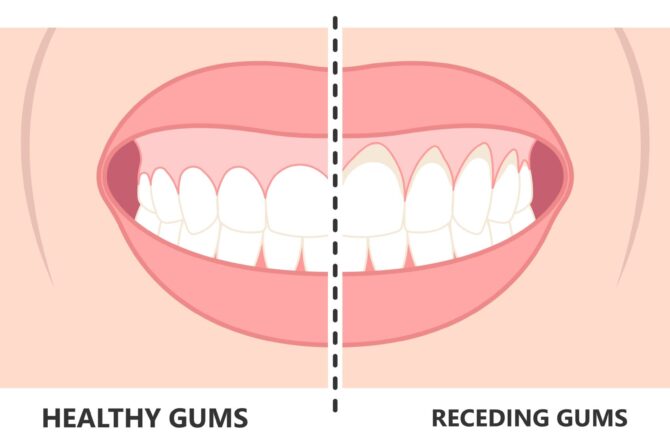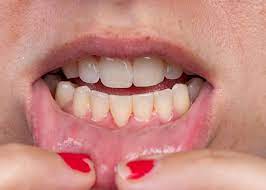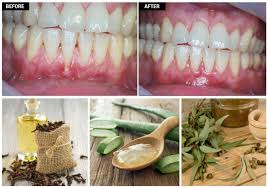
Signs of Receding Gums and How to Regrow Gums Naturally
Do you brush your teeth regularly? Floss? See your dentist for semiannual checkups and cleanings. You’re doing everything right to keep your smile healthy and sparkling. But then, one day, you notice that your gums seem to be receding. What’s going on, and how can you address the problem?
Overview:
Your gums play an important role in oral health, and if they begin to recede, it can signify a bigger problem. Receding gums are often the first symptom of gum disease, a serious infection that can damage your mouth’s soft tissue and bones. Gum disease is caused by plaque that constantly forms on your teeth. If not removed, plaque can harden into tartar, which inflames the gums and leads to gum recession. Gum recession is a serious issue because it can lead to tooth loss.
In this blog post, we’ll share some secrets to regrow gums naturally. Ready to get started for healthy, happy gums? Let’s go!
Signs that you have receding gums:
Read on to know about telltale signs of receding gums and what you can do about them.
Bleeding Gums:
Bleeding gums are the very first sign of gum disease. This usually happens when you brush or floss your teeth. The gums may also bleed after eating hard foods or using a toothpick.
Sensitive Teeth:
Another early sign of gum disease is sensitive teeth. This is because the gums no longer protect the roots of the teeth as they should. As a result, the roots become exposed and more susceptible to temperature changes and cause tooth decay. If you have sensitive teeth, use toothpaste made for sensitive teeth and avoid extremely hot or cold beverages. Talk to your dentist about getting dental sealants, which can help protect the exposed roots of your teeth from decay.
Bad Breath:
Bad breath, also known as halitosis, is also a common sign of gum disease. This is because the bacteria that cause gum disease release toxins that give off an unpleasant odor. See your dentist if you have persistent bad breath that doesn’t go away with brushing and flossing.
Loose Teeth:
As gum disease progresses, it weakens the structures that support your teeth—the gums, bones, and connective tissue—which can cause your teeth to become loose.
Receding Gums:
Last but not least, one of the most obvious signs of receding gums is—you guessed it—receding gums! Gum recession is when the gum tissue around the tooth pulls back away, exposing more of the tooth’s root. This can happen gradually over time or quite suddenly. Either way, it’s important to see your dentist so they can determine the cause and develop a treatment plan.

Massaging gums to regrow:
We brush and floss our teeth daily to keep them clean and healthy. But did you know that massaging your gums can also help to keep them healthy? Gum massage can help to increase blood circulation and promote the growth of new gum tissue. It can also help reduce inflammation and the risk of gum disease. While regular brushing and flossing are essential for preventing gum disease, massaging can be a powerful tool for reversing damage already done.
Simply use your toothbrush or a gauze pad to massage the gum line in a circular motion to massage your gums gently. For best results, do this for two minutes every day. Including gum massage in your daily oral care routine can help keep your gums healthy and strong.
Natural ways to regrow gums:
While there are several treatments available, they can be costly and may not be effective. Fortunately, there are some natural remedies for receding gums. Here are some tips to get you started:
– Eat foods rich in vitamin C: Vitamin C is essential for gum health. It helps to keep the gums strong and prevents them from bleeding. Foods high in vitamin C include oranges, grapefruits, strawberries, bell peppers, and dark leafy greens.
– Increase your vitamin D intake: Vitamin D is another important nutrient for gum health. It helps to fight inflammation and bacteria in the mouth. Foods high in vitamin D include fatty fish, eggs, and mushrooms.
– Quit smoking: Smoking is a major risk factor for gum disease. If you smoke, quitting is one of the best things you can do for oral health.
– Practice good oral hygiene: Good oral hygiene is essential for healthy gums. Be sure to brush twice daily, floss daily, and use an antibacterial mouthwash.
These tips can help you get started on the road to healthier gums. However, if you are concerned about your gum health, see your dentist for an evaluation. They can determine if you have gum disease and recommend the best treatment.

I regenerated receding gums naturally with home remedies:
For years, I had problems with my gums. They were sensitive, prone to bleeding, and worst of all, receding. I tried every gum product on the market, from special gels to mouthwashes, but nothing seemed to work. My dentist told me that my only option was to get surgery. But I didn’t want to go down that route. So, I discovered that some natural remedies could help against periodontal disease. Here’s what worked for me.
Oil Pulling:
Oil pulling is an ancient Ayurvedic technique that involves swishing oil around your mouth for 20 minutes to remove toxins. I started doing this every morning and noticed a difference in my gums within a week. They were less inflamed and looked healthier overall.
Aloe Vera:
Aloe vera has long been used as a natural remedy for various skin conditions, including burns and inflammation. When it comes to receding gums, aloe vera can help by reducing gum inflammation and promoting healing. Apply aloe vera gel to your gums twice a day, and you should start seeing results within a few weeks.
Green Tea:
The third home remedy I want to share is green tea. Green tea contains a compound called epigallocatechin gallate (EGCG), which has powerful anti-inflammatory and antioxidant properties. These properties make green tea an effective natural treatment for receding gums.
Brew a cup of green tea and let it cool before swishing it around your mouth for two minutes. Do this once or twice a day, and you should see an improvement in your gum health within a few weeks. In addition to drinking one or two cups of green tea each day, taking a supplement with lycopene and green tea extract can promote your gum health, and chewing green tea chewing gum can reduce signs of inflammation, plaque formation, and gum bleeding.
Turmeric:
Turmeric is another spice with anti-inflammatory properties. I mixed turmeric powder with water to form a paste and applied it directly to my gums. This helped reduce the swelling and redness.
Tea Tree Oil:
I also used Tea tree oil as it has antiseptic and anti-inflammatory properties that can help to reduce the inflammation and swelling of gums. It also has antibacterial properties that can help to kill the bacteria that may be causing the receding gums. Tea tree oil can be applied directly to the gums or added to a warm water mouth rinse.
Garlic:
Garlic is an excellent home remedy for receding gums. It is a natural antiseptic agent that helps to clean and heal the gums. It also helps to reduce inflammation and pain. Garlic can be taken as capsules, tablets, or liquid extract. It can also be used as a mouthwash or added to food.
Lemon Juice:
It is believed that lemon juice can help to prevent and even reverse receding gums, so I tried it. This is because lemon juice is high in Vitamin C, which benefits the gums. In addition, lemon juice has antibacterial properties, which can help fight off any bacteria that may be causing the gum recession.
If you are experiencing receding gums, it may be worth trying lemon juice as a natural remedy. Apply a few drops of lemon juice to a cotton ball and brush it over your gums twice a day.
Dietary Changes:
I also changed my diet, including cutting out sugary foods and drinks, which can contribute to gum disease. I also started eating more crunchy fruits and vegetables like apples and celery, which help clean your teeth naturally as you eat them and grow back your receding gum tissue.
Therefore, Within two months of using these natural home remedies, my gums had healed completely! If you’re suffering from receding gums, give these remedies a try—I’m sure they’ll work for you just as well as they did for me!
Can receding gums grow back:
The quick answer is yes; gums can grow back. However, it depends on the severity of the gum recession and how much gum tissue has been lost. In some cases, gums will only grow back partially, and in other cases, they will not grow back. Gum recession is most often caused by gum disease, so it is important to practice good oral hygiene and see a dentist regularly.
If you catch gum disease early, you may be able to reverse the damage and prevent further gum loss. However, once gum tissue has been lost, it isn’t easy to regrow. In some cases, surgery may be necessary to correct the problem. So, if you are concerned about receding gums, see a dentist as soon as possible.
Conclusion:
So, you can treat receding gums by using the above natural home remedies. They’re not only affordable but also effective. Adding natural treatments to accepted medical or surgical therapies for gum disease might help improve outcomes. If you don’t see any improvement in your gum health after initial treatment, it’s time to visit the dentist.
However, give Dental Pro 7 a try if you want to take things a step further. It’s a natural dental product that can aid in treating gum disease and other oral health concerns. It is entirely safe to use and comes with a money-back guarantee to test it out risk-free. Dental Pro 7 is excellent for improving oral health if you seek effective treatment.
Leave a reply